OCZ Vector 150 (120GB & 240GB) Review
by Kristian Vättö on November 7, 2013 9:00 AM EST- Posted in
- Storage
- SSDs
- OCZ
- Indilinx
- Vector 150
Random Read/Write Speed
The four corners of SSD performance are as follows: random read, random write, sequential read and sequential write speed. Random accesses are generally small in size, while sequential accesses tend to be larger and thus we have the four Iometer tests we use in all of our reviews.
Our first test writes 4KB in a completely random pattern over an 8GB space of the drive to simulate the sort of random access that you'd see on an OS drive (even this is more stressful than a normal desktop user would see). I perform three concurrent IOs and run the test for 3 minutes. The results reported are in average MB/s over the entire time. We use both standard pseudo randomly generated data for each write as well as fully random data to show you both the maximum and minimum performance offered by SandForce based drives in these tests. The average performance of SF drives will likely be somewhere in between the two values for each drive you see in the graphs. For an understanding of why this matters, read our original SandForce article.
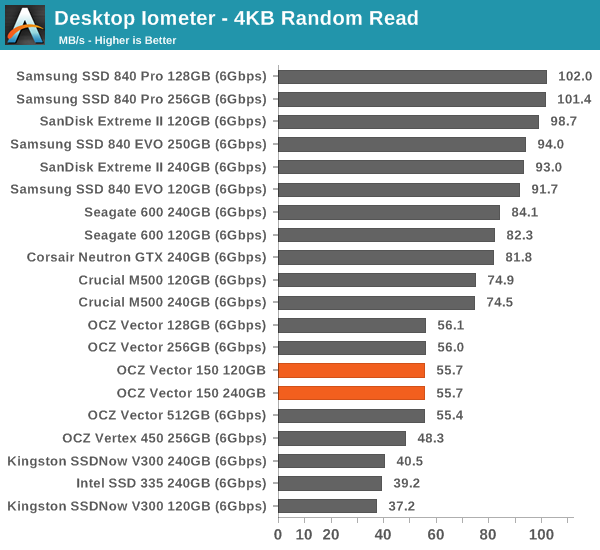
Random read performance remains unchanged but the Vector 150 wasn't supposed to bring any improvements to that anyway.
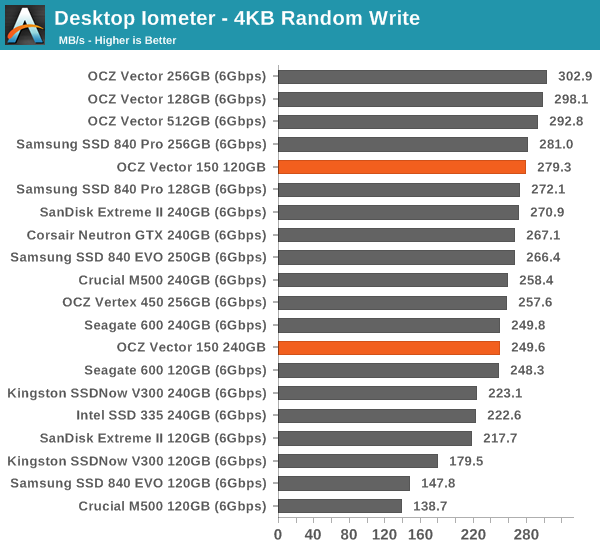
Random write speeds at queue depth of 3 take a hit, though I'm thinking this might be due to the new smaller process node NAND. When the queue depth is increased to 32, the performance is on-par with the original Vector thanks to parallelism.
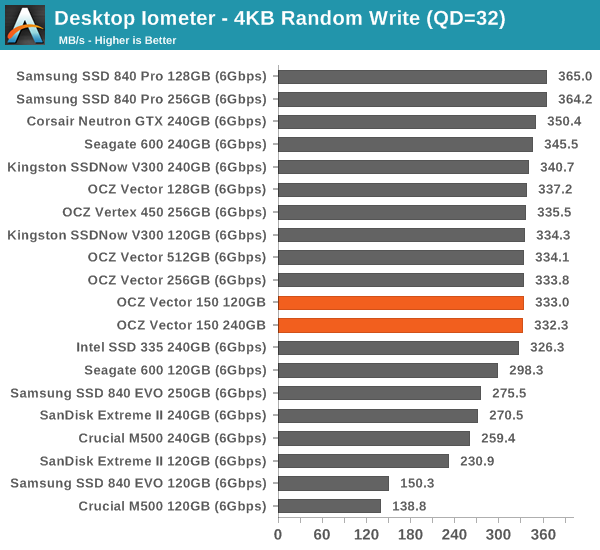
Sequential Read/Write Speed
To measure sequential performance I ran a 1 minute long 128KB sequential test over the entire span of the drive at a queue depth of 1. The results reported are in average MB/s over the entire test length.
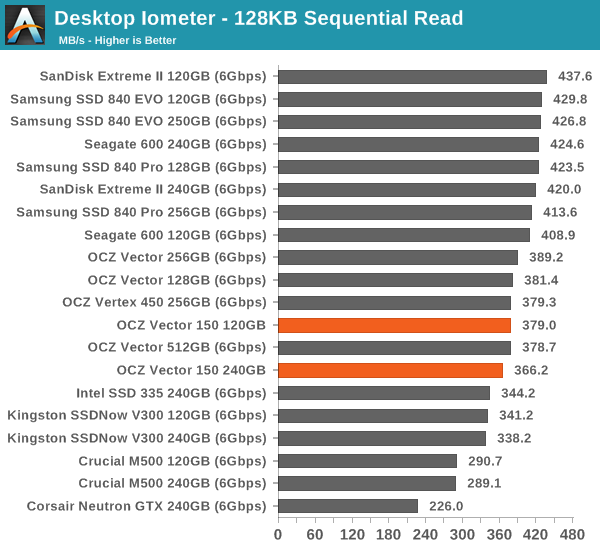
No surprises here either. Sequential performance has remained mostly the same for the last year or so and we won't see another bump until M.2 and other PCIe-based designs get more popular.
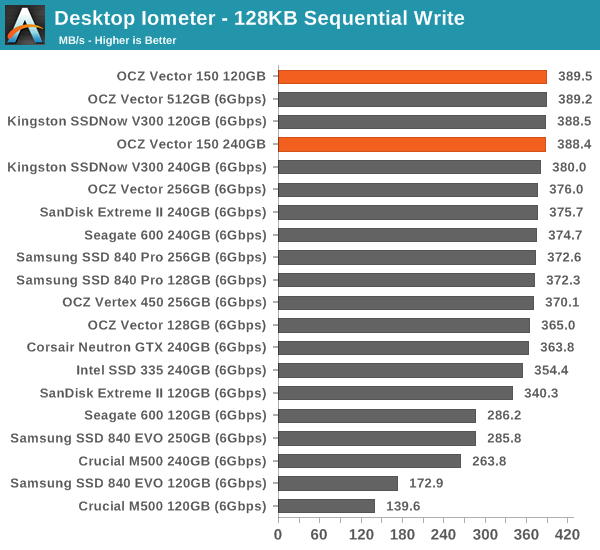
AS-SSD Incompressible Sequential Read/Write Performance
The AS-SSD sequential benchmark uses incompressible data for all of its transfers. The result is a pretty big reduction in sequential write speed on SandForce based controllers.
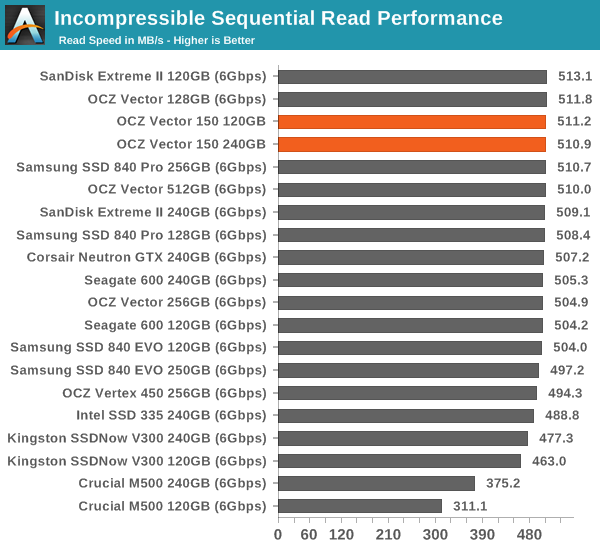
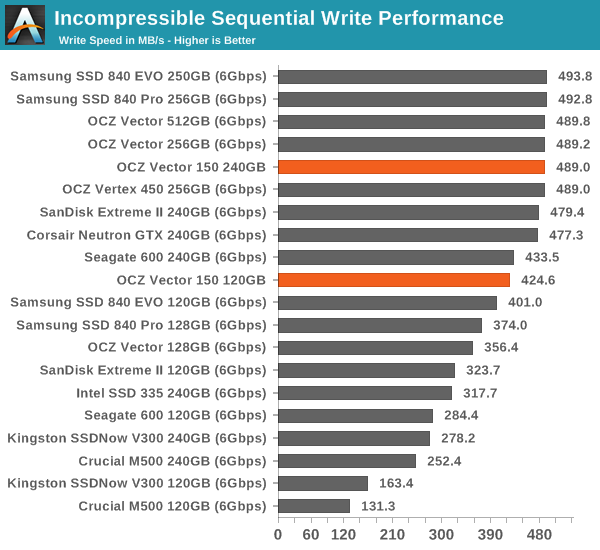










59 Comments
View All Comments
Kristian Vättö - Friday, November 8, 2013 - link
With very light usage, I don't think there is any reason to pay extra for an enthusiast class SSD, let alone enterprise-grade. Even the basic consumer SSDs (like Samsung SSD 840 EVO for instance) should outlive the other components in your system.LB-ID - Friday, November 8, 2013 - link
OCZ as a company has, time and again, proven their complete contempt for their customer base. Release something in a late alpha, buggy state, berate their customers for six months while they dutifully jump through all the hoops trying to fix it, then many months down the road release a bios that makes it marginally useful.Not going to be an abused, unpaid beta tester for this company. Never again. Will lift a glass to toast when their poor products and crappy support ultimately send them the way of the dodo.
profquatermass - Friday, November 8, 2013 - link
Then again I remember Intel doing the exact same thing with their new SSDs.Life Tip: Never buy any device on day #1. Wait a few weeks/months until real-life bugs are ironed out.
Kurosaki - Saturday, November 9, 2013 - link
Where is the review of Intels 3500-series?and why aren't the bench getting any love? :-('nar - Sunday, November 10, 2013 - link
I am surprised by all of the negative feedback here, they must all be in their own worlds. Everyone can only base their opinion on their own experiences, but individuals lack the statistical quantity to make an educated determination. I have been using OCZ drives for three years now. The cause of failure of the only one's that have failed have been isolated, and corrected. A "corner issue" where a power event causes the corruption of the firmware rendering the drive inert, corrected in the latest firmware.1. REVO is "bleeding edge" hardware, expect to bleed
2. Agility is cheap crap, throw it away
3. Vertex and Vector lines have been stable
It is interesting how many complain, yet do not provide specifics. Which model drive? What motherboard? What firmware version? I do not care for the opinions of strangers, you need to back it up with details. People get frustrated by inconvenience, and often prefer to complain and replace rather than correct the problem. As I said, I use OCZ on most of my computers, but I install Intel and Plextor for builds I sell. Reliability and toolbox are more practical for most users, and Intel is among, if not the top, of the most reliable drives.
hero4hire - Monday, November 11, 2013 - link
Much of the hate has to do with how consumers were treated during the support process. I can only imagine if a painless fast exchange for failed drives was the status quo we wouldn't have the vitriol posted here. OCZ failed at least twice, with hardware and then poor support.lovemyssd - Sunday, November 24, 2013 - link
right. no doubt thereof comments are from those playing with their stock price. That's why genuine users and those who know can't make sense out of the bashing.KAlmquist - Sunday, November 10, 2013 - link
The review states that the Vector 150 is better than the Corsair Neutron in terms of consistency, but the graphs indicate otherwise. At around the 100 second mark, the Vector 150 drops to around 3500 IOPS for one second, whereas the Neutron is always above 6000 IOPS. So it seems there is a mistake somewhere.CBlade - Wednesday, June 4, 2014 - link
How about that Toshiba second generation 19nm NAND that Kristian mentioned? How we can identify part number on this new SSD? I want to know if the NAND its better or not.